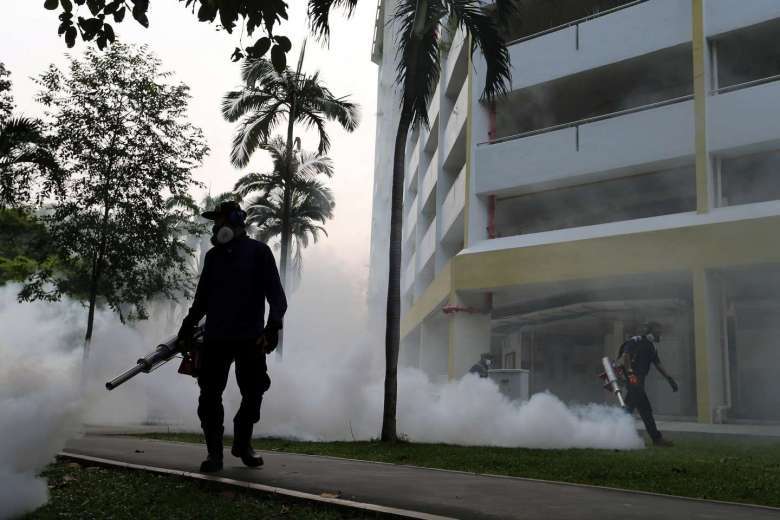TL;DR – If you weren’t worried previously, you’d better be now.
As at 12noon yesterday (Aug 28), there were a total of 41 confirmed cases of Zika infection in Singapore. None of the cases are known to have travelled to Zika-affected areas recently, suggesting local transmission.
More cases are expected to be identified over the next few days.
Here’s what you need to know:
1) What is the Zika virus?
The Zika virus was first identified in Uganda in 1947 and as of early 2016 , a widespread outbreak of Zika fever, caused by the Zika virus, is ongoing in the Americas and the Pacific. The outbreak began in April 2015 in Brazil, and has spread to other parts of South and North America; it is also affecting several islands in the Pacific.
While the virus may have little or no symptoms in humans, it may cause birth defects in babies born to some infected pregnant women.
2) The Zika virus is spread by mosquito bites and by sex
The Zika virus infection is transmitted by the bite of an infected Aedes mosquito. Zika can be passed through sex from a person who has Zika to his or her sex partners.
3) How do I know if I have Zika?
The symptoms for Zika include:
- Mild fever
- Rashes
- Headaches
- Muscle pain
- Joint pains
- Conjunctivitis (a form of eye inflammation)
However, most people infected with the Zika virus do not develop symptoms. For those who do, the symptoms are often very mild. They usually develop within 3 to 12 days after the mosquito bite and often last between 4 to 7 days.
4) Aljunied Crescent and Sims Drive

The current hot spot for Zika virus in Singapore after 41 cases were confirmed as at 28 August 2016.
5) Other areas of concern
Other areas in Singapore are also being monitored:
1. Khatib Camp
2. Sembawang Drive
3. Kranji Road
4. Joo Chiat Place
5. Senoko South Road
6. Toh Guan Road East
7. Lorong 101 Changi
6) There is currently no treatment for Zika
There are no approved drugs or vaccines for Zika, mainly because scientists long assumed the virus was so benign that it wasn’t worth the resources required to investigate treatment. Zika has not been widely examined, and while some early research noted that the virus could infect brain cells, the connection between Zika and microcephaly—a severe neurological birth defect—is relatively new. Even now, many people who get infected will never know it, and if they start showing signs of infection, such as a rash, red eyes, fever or joint pain, doctors have little to offer other than advice to stay hydrated or take Tylenol as needed.
7) The best way to prevent Zika is to prevent mosquito bites
- Use insect repellent.
- Wear long-sleeved shirts and long pants.
- Stay in places with air conditioning or window and door screens.
- Cooperate with NEA, and allow its officers to inspect your premises for mosquito breeding and to spray insecticide to kill any mosquitoes.

8) Zika is linked to birth defects
Zika virus infection may cause microcephaly in the unborn foetuses of pregnant women. Microcephaly is a rare neurological condition that manifests itself as birth defects in which a baby is born with significantly smaller heads.
Pregnant women should hence try as much as possible to prevent mosquito bites.
9) So should couples wait to try to get pregnant?
Some countries are recommending women put off getting pregnant: El Salvador has told women to wait two years, and some health officials in Puerto Rico have said to wait for the time being.
The U.S. Department of Health & Human Services advises,

10) If I am not pregnant or intending to have children soon, why should I care?
Though uncommon, Zika appears to cause other brain and autoimmune problems, including Guillain-Barré syndrome (GBS), a disorder in which the immune system attacks nerves, leading to weakness and temporary paralysis.
In short, this basically means that the Zika virus may infect adult brain too.
11) What happens now?
NEA has since intensified vector control operations to control the Aedes mosquito population in the vicinity of Aljunied Crescent/ Sims Drive.
MOH will continue to screen the close contacts of confirmed cases. MOH is also carrying out Zika testing on others living and working in the Aljunied Crescent/ Sims Drive area and other areas of concern who have symptoms of fever and rash. MOH has also alerted all GPs, polyclinics and hospitals to be extra vigilant and to immediately report patients with symptoms associated with Zika virus infection to MOH.
If you are living or working in the affected area of Aljunied Crescent/ Sims Drive and the other areas of concern, especially pregnant women, please monitor monitor health and seek medical attention if you feel unwell, especially with symptoms of fever and rash. You should also inform their doctors of the location of their residence and workplace.
(Cover image via)
